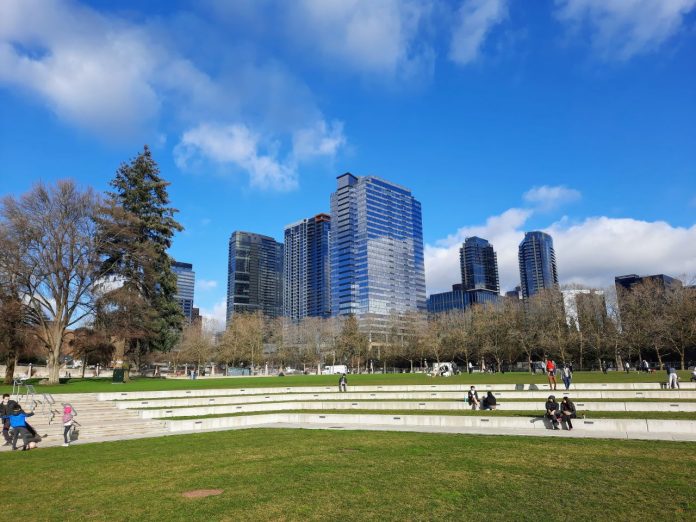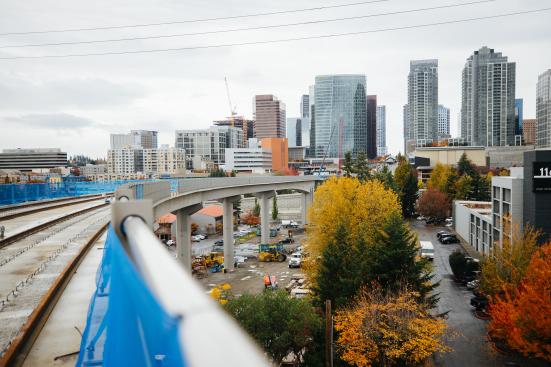
Three Bellevue City Council seats are up for election this year and voters face a stark choice. Electing progressive challengers Ruth Lipscomb and Dexter Borbe over conservative incumbents would shift the Bellevue Council in a progressive direction after years of cautious conservatism. Technically these races are nonpartisan but incumbents Jared Nieuwenhuis and Conrad Lee have conservative records and associations that betray their leanings. Nieuwenhuis has also donated extensively to Republican campaigns.
The Bellevue Council has three conservatives, three progressives, and one moderate swing vote in Lynne Robinson, who is also serving as Mayor. Unlike Seattle, Bellevue has a City Manager/Council form of government – seven councilmembers are elected citywide and are then tasked with hiring the City Manager, who is the chief executive of the city. The Councilmembers do elect a mayor and a deputy mayor from amongst themselves every two years. The role of the mayor is mainly to direct meetings, but importantly, they also get to decide what appears on the Council’s agenda. The current deputy mayor is Nieuwenhuis. Robinson is up for election, but is facing a challenge from a right-wing Republican.
Replacing Nieuwenhuis and Lee with Lipscomb and Borbe would shift power to the progressive side, finally allowing the city a path to make major progress on key issues like housing, climate, and safe streets. Lee has had 28 years on Council but has made little progress on any of that.
Lipscomb and Borbe are pledging more aggressive action on affordable housing, which is shaping up to be one of Bellevue’s defining issues, as it absorbs a promised 25,000 Amazon tech jobs and six light rail stations coming with East Link. Without intervention to relax restrictive zoning and fund social housing, that burst of corporate job growth will take an already expensive city and make it even more so, cementing it as a rich-only enclave.

Bellevue’s existing leadership have bragged about how ready they are for Amazon’s Bellevue hiring surge and relished stealing Seattle’s thunder. Playing the part of rebound city and winning Amazon’s jobs and favor is the easy part. The hard part is growing equitably and sustainably, and on that front the city appears ill-prepared, as The Urbanist covered in January.
Bellevue real estate interests appear so interested in this “eating Seattle’s lunch” narrative that they’re paying Geekwire to publish a puff piece series on the topic, hoping to entice homebuyers to pay the $1.25 million median home price in Bellevue and convince residents that Bellevue’s more conservative policymaking approach is an asset rather than a hindrance.
It’s a narrative Bellevue’s conservative councilmembers are also invested in promoting. Deputy Mayor Nieuwenhuis went on conservative talk radio to brag of how Bellevue is rolling out the red carpet for Amazon unlike Seattle: “Myself and a couple of colleagues — like Councilmember Jennifer Robertson — met a couple of folks from Amazon at a business dinner recently, and we actually went up to them and said, ‘We’re glad that you’re in Bellevue, welcome. Let us know if there’s anything we can do for you.’ And they looked at us like we were from Mars.”
Beyond the compliments and niceties, Bellevue has also avoided corporate taxes like the plague, such as the JumpStart progressive payroll tax. That tax estranged Seattle from Amazon, but allows Seattle to fund $235 million annually in low-income housing, small business support, and Green New Deal programs — plus avert deep Covid recession cuts to social services.
That fealty has been rewarded as Nieuwenhuis is getting a huge surge of corporate donations — unprecedented in Bellevue politics, but all too familiar in Seattle — in an effort to help him hold onto his seat and continue to be a doormat for big business.
Nieuwenhuis can boast of Seattle Times endorsement, but interestingly Lee cannot. The Seattle Times endorsed Borbe instead and flagged as one reason Lee’s opposition to a permanent men’s homeless shelter, which helped delay the much needed project (it’s finally under construction). The shelter was hugely contentious as the first of its kind in Bellevue, which has long lacked a year-round shelter for homeless men. Nieuwenhuis also voted against the men’s shelter in 2017, which the Seattle Times conveniently overlooked in its endorsement.
Bellevue has been content letting Seattle and the County deal with the regional homelessness crisis without much help. The City opted out of the County’s homeless shelter funding plan, arguing it could do better on its own. Forging out on its own, it’s not clear if the City will create affordable housing geared toward homeless people or people at higher income thresholds. This exceptionalism isn’t the attitude of a city ready to embrace growth and being a regional leader. The era of Bellevue sweeping its problems under the rug cannot continue. It’s time for an era of tackling long-ignored problems with progressive solutions.
Doug Trumm is publisher of The Urbanist. An Urbanist writer since 2015, he dreams of pedestrian streets, bus lanes, and a mass-timber building spree to end our housing crisis. He graduated from the Evans School of Public Policy and Governance at the University of Washington in 2019. He lives in Seattle's Fremont neighborhood and loves to explore the city by foot and by bike.






